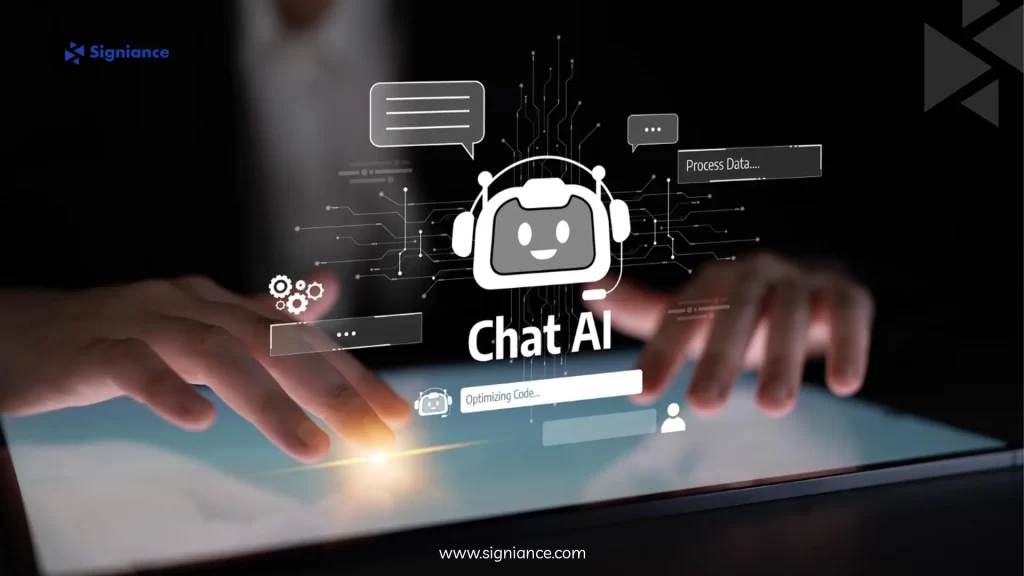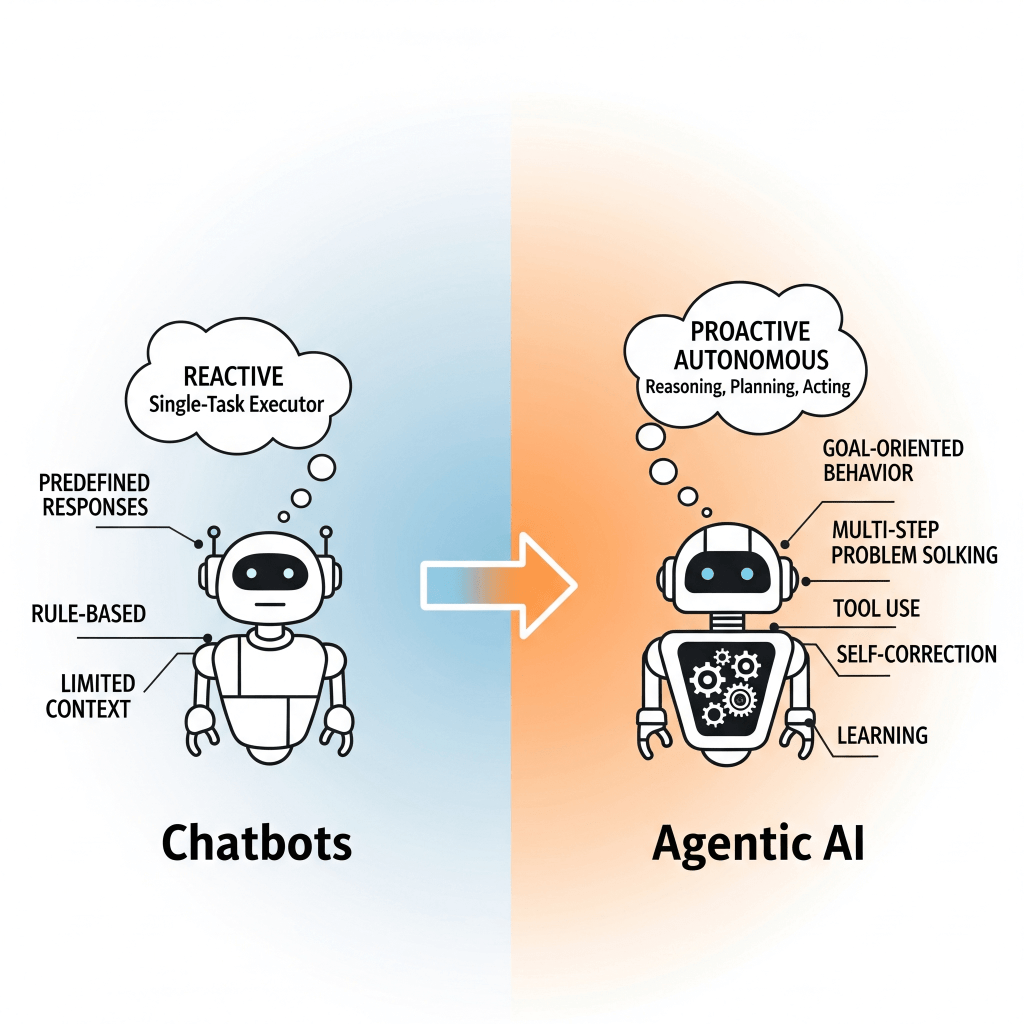
The year 2024 was defined by the chatbot. Every website had a pop-up in the corner offering to help. Every developer was experimenting with large language models (LLMs) to make their tools “smarter.”
We were all amazed by their ability to generate code, draft emails, and answer our questions in a human-like way. It felt like we had a super-powered digital intern.
But if you’re a startup founder, you’ve likely run into the chatbot’s biggest limitation: it’s a brilliant conversationalist, but a terrible doer.

A traditional chatbot can tell you how to reset your password, but it can’t go into your system and do it for you. It can draft a marketing email, but it can’t send it to a segment of your list, track the open rates, and follow up with non-openers. It’s a tool that reacts to a single prompt, not a team member that can reason, plan, and execute a multi-step project.
The next evolutionary leap in AI, and the one that will truly define success for startups in 2025 and beyond, is agentic AI. It’s not just a better chatbot; it’s the foundation for a “team” of autonomous AI workers.
The Chatbot Era is Over (And We Didn’t Even Realize It)
Let’s be clear: the generative AI tools we’ve used up until now are a massive step forward. They’ve democratized access to content creation and information synthesis. But they operate in a a reactive, single-turn loop.
- You ask a question. The chatbot answers.
- You give a command. The chatbot executes that one command.
This is a powerful function, but it’s the digital equivalent of having a brilliant but disengaged intern. It waits for instructions and, without a human to guide every single micro-step, it can’t achieve any real, tangible business results.
Think about a common startup challenge: onboarding a new customer. A chatbot might be able to answer their initial questions, but it can’t check their account status, send them a personalized welcome email, trigger a notification for a sales rep, and schedule their first training session, all at once, and all without human supervision. This is where the old model breaks down, and where the new one begins.
The Agent Revolution: What an AI Worker Actually Is
Agentic AI systems are a class of autonomous intelligence. Unlike their predecessors, they are designed to possess a core set of abilities that empower them to act independently and achieve higher-level goals. They are the difference between a tool and a true colleague.
An AI worker operates through a distinct loop of capabilities:
- Reasoning: It breaks down a complex, high-level goal into a series of smaller, manageable steps.
- Planning: It creates a logical sequence of actions to achieve that goal.
- Acting: It interacts with external systems (like your CRM, your database, or your email provider) via APIs to carry out those actions.
- Reflecting: It evaluates its own progress, identifies any failures or roadblocks, and adjusts its plan to stay on course.
This isn’t just a faster way to do things; it’s a fundamentally different way to build a business. For a startup with a small team and limited resources, this is a game-changer that allows you to automate entire departments, not just individual tasks.
Your Startup’s Newest Team Members: Agentic Use Cases in Action
Imagine what a team of AI workers could do for your startup. This isn’t a sci-fi fantasy; these are real, implementable workflows today.
- The Marketing Agent: Your marketing lead gives a single command: “Launch a campaign for our new feature with a 15% click-through-rate goal.” The AI worker doesn’t just write a blog post. It researches trending keywords, drafts an SEO-optimized article, writes multiple variations of social media posts, schedules them across platforms, and uses a built-in analytics tool to measure performance. If click-throughs are low, it can autonomously re-draft the headlines and re-post at a more optimal time.
- The Customer Success Agent: A customer submits a support ticket about a failed payment. This isn’t a simple FAQ. The AI worker’s goal is to resolve the issue. It first uses an API to check the customer’s payment history, identifies the error code, and drafts a personalized email explaining the problem. It then creates a secure one-time payment link and sends it to the customer. Once the payment is completed, it automatically marks the ticket as resolved and notifies the customer success manager. The entire process, from inquiry to resolution, is handled without a human touching it.
The Sales Prospecting Agent: You give a sales agent one goal: “Find and qualify 20 new leads from the e-commerce sector.” The agent can autonomously scour the web, identify potential companies and key contacts, cross-reference them with your ideal customer profile, and populate a CRM with detailed information.
It can even draft a hyper-personalized first-touch email based on the company’s recent news, all while following your sales playbook.
How to Build Your “AI Team” (Without a PhD in AI)
The most exciting part for startups is that you don’t need to hire a team of AI researchers to get started. AWS, with services like Amazon Bedrock, is providing the managed “Lego blocks” for building these agentic systems. You can access powerful foundational models from leading providers and connect them to your existing business tools.
The process is simplified into a few key steps:
- Identify the “Mission”: Pinpoint a workflow that is repetitive, time-consuming, and a bottleneck for your team.
- Select a “Brain”: Choose the right foundation model from a selection on Amazon Bedrock, which is best suited for your task’s needs.
- Provide the “Tools”: Connect your AI agent to the APIs of the software your business already uses. This gives it the ability to act.
- Set the Rules: Define the guardrails and goals for your agent in natural language. This ensures it operates within your brand’s voice and legal constraints.
The era of simple, reactive chatbots is over. The future of AI for startups is not about building more sophisticated chat tools, but about building autonomous, intelligent workers that can scale your operations.
Key Takeaways:
- Agentic AI is a multi-step problem solver, not a single-turn responder. It plans and acts, where chatbots only react.
- It enables true workflow automation, freeing up your team from bottlenecks. This is a huge competitive advantage for startups.
- Platforms like Amazon Bedrock make it accessible. You can build these systems without massive R&D costs.
Ultimately, the most successful startups won’t be the ones that have the most intelligent chatbots. They will be the ones that have assembled the most efficient, autonomous, and productive “AI team.” The question for you isn’t if you’ll adopt this technology, but what mission you’ll give your first AI worker.
